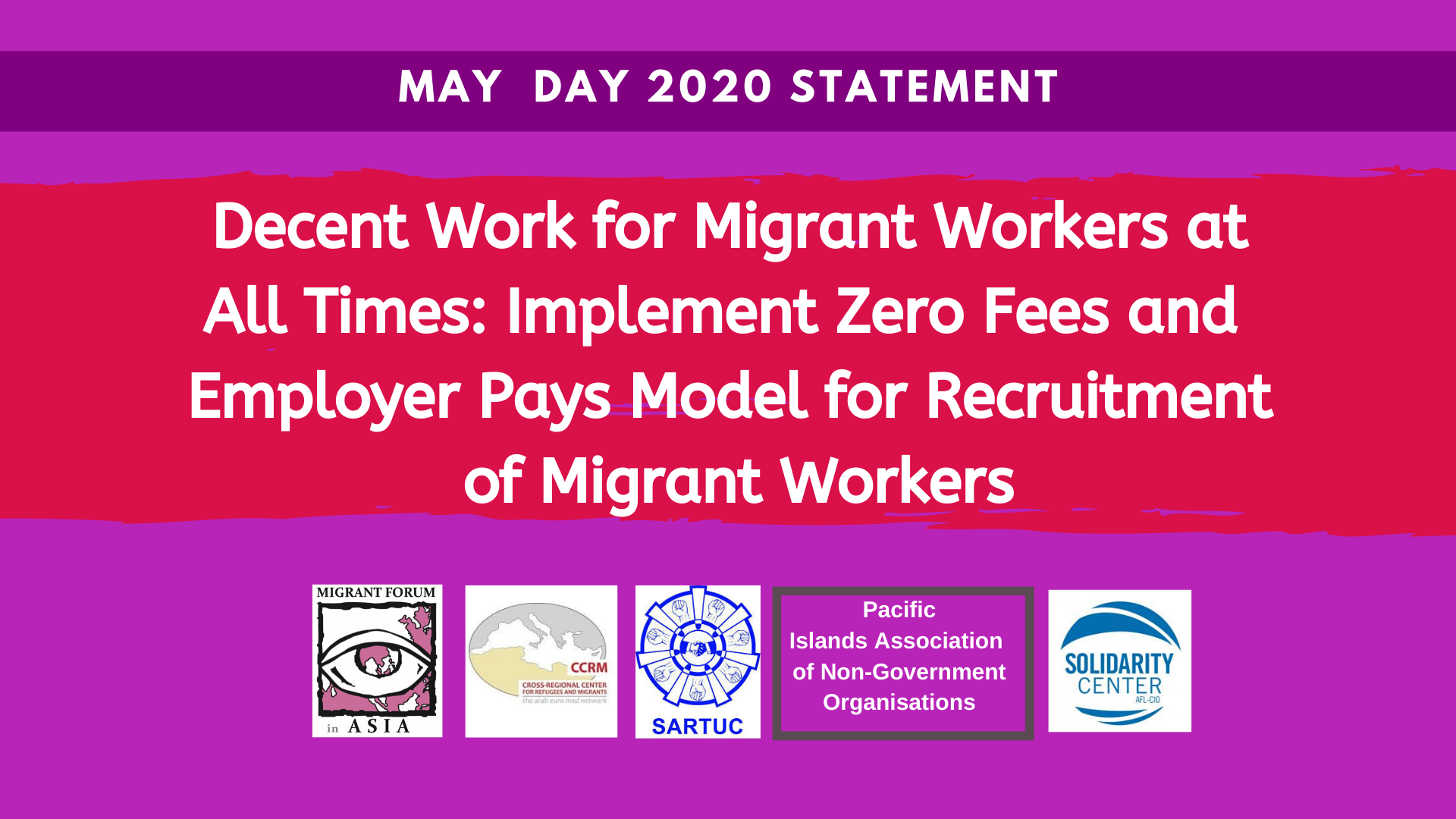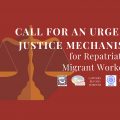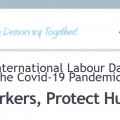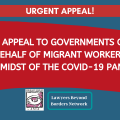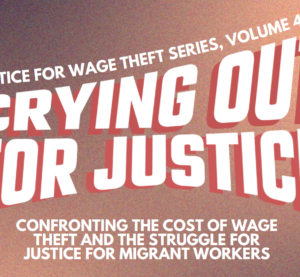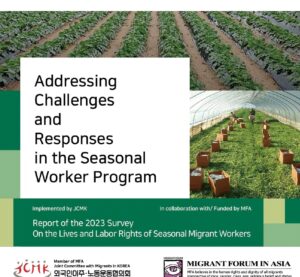Decent Work for Migrant Workers at All Times: Implement Zero Fees and Employer Pays Model for Recruitment of Migrant Workers
— April 29, 2020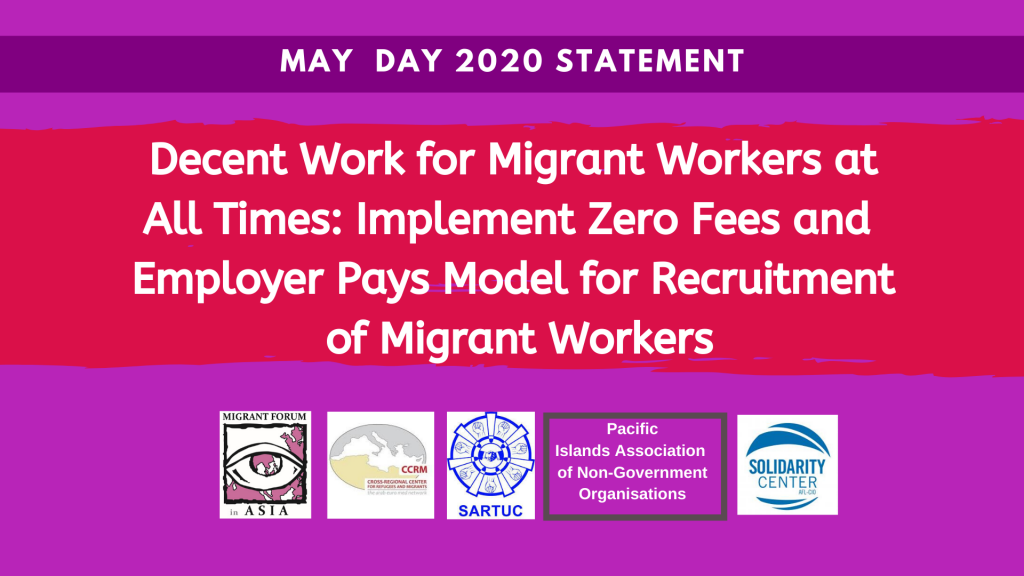
A statement by Migrant Forum in Asia (MFA), Cross-regional Center for Refugees and Migrants (CCRM), South Asian Regional Trade Union Council (SARTUC), Pacific Islands Association of Non-Government Organisations, Pacific Region, and Solidarity Center.
While the COVID-19 pandemic is evidently affecting every individual’s life, the severity of its impact is carried largely by the most vulnerable sector of our society. The extensive impact of the pandemic, stretches from threats to an individual’s health, welfare, and livelihood to the economic and political stability of a country. All these pile-up and exacerbates the struggle of the vulnerable groups including migrant workers. Many migrant workers have been found positive for COVID-19. Health care workers are among those vulnerable as they are at the frontline treating those who are sick. Migrants living in crowded and unsanitary dormitories were also infected with COVID-19. Women migrant domestic workers are working much longer hours, exposed to violence in the workplace and unable to seek help due to quarantine measures put in place.
In the current global economic system, migrant workers pay exorbitant recruitment fees to secure low paying jobs. As a result, migrant workers typically remain indebted for as much as a year or two before they are able to earn a proper living wage enabling them to sustain themselves and their families. The current corona virus crisis has put an abrupt end to the deployment and employment of millions of migrant workers across the globe, many of which are indebted to agents, subagents, family members or small lenders back home.
If there is one thing that we could learn from this crisis is that we must radically bring an end to the current situation of and move towards an employer pay model of recruitment. No worker should have to embroil one’s self in debt in order to secure a job.
The 2030 Sustainable Development Goals (2030 SDGs) recognizes the positive contribution of migrants for inclusive growth and sustainable development. Goal 8 on decent work further calls for the protection of labour rights and promotion of safe and secure working environments for all workers, including migrant workers, in particular women migrants, and those in precarious employment.
The Global Compact for Migration (GCM) adopted by governments in 2018 specifically calls on states to facilitate fair and ethical recruitment and safeguard conditions that ensure decent work. The GCM called on governments to prohibit recruiters and employers from charging or shifting recruitment fees or related costs to migrant workers in order to prevent debt bondage, exploitation and forced labour, including by establishing mandatory, enforceable mechanisms for effective regulation and monitoring of the recruitment industry.
At the global level, United Nations (UN) agencies have also called on governments and all stakeholders to address issues of recruitment of migrant workers including the prohibition of the charging of recruitment fees. The International Labour Organisation (ILO) General Principles and operational guidelines for fair recruitment states that recruitment fees or related costs should not be collected from workers by an employer, their subsidiaries, labour recruiters or other third parties providing related services. The International Organization for Migration (IOM) initiated International Recruitment Integrity System (IRIS) Standard prohibits the charging of recruitment fees and related costs from the jobseekers.
Regional Consultative Processes have recognized that achieving decent work for migrants includes addressing issues related to recruitment of migrant workers. The 2016 Colombo Process ministerial declaration recommended member states to work towards the transformation of the recruitment industry through ensuring that the recruitment/placement of migrant workers from Colombo Process member states shall be at no cost to the worker. The 2017 Abu Dhabi Dialogue during its fourth ministerial consultation declared that member states will continue to lend priority to regional cooperation aimed at promoting lawful, fair and transparent labour recruitment practices.
As countries continue to implement quarantine and lockdown measures, many industries in countries of destination remain shut down leading to loss of jobs for millions of migrant workers. Some are put on forced leave without pay, some are experiencing pay reductions, while others are in no work no pay situations.
The quickly evolving situation in countries of destination has also halted the deployment of new and returning migrant workers which leaves them in ‘limbo’ unsure if they still have jobs. Migrant workers who are on home leave are also unsure of their employment status, not knowing whether they can still return to their jobs abroad.
Over concerns on the conditions of migrant workers in countries of destination and migrants stranded in countries of origin, there is one issue that runs through irrespective of their vulnerability in the current situation. Many of them have to service their debts incurred to the recruiter or a third party regardless of their employment situation. Being in debt, but unable to work and earn a living, migrant workers are faced with an impossible situation. To clear their debt, many might resort to accepting exploitative working conditions out of desperation. While others might refuse repatriation after travel restrictions are lifted in order to continue working as undocumented workers to be able to pay their debts and provide for their families.
Provide Decent Work for Migrants and Uphold the Employer Pays Model
On the occasion of May Day 2020 we reiterate the calls for decent work and fair recruitment of the 2030 SDGs, the Global Compact for Migration, ILO Fair Recruitment Agenda, the IOM IRIS standard, the Colombo Process, and the Abu Dhabi Dialogue. We call on governments to ensure that no workers should have to pay recruitment fees to secure decent work. Furthermore we recommend the following actions be taken:
- We call on governments to review and amend existing policies and procedures on recruitment to take into consideration situations of crisis such as the current COVID-19 pandemic.
- Governments need to ensure that in this time of crisis private recruitment agencies (understood to mean in countries of origin and destination) are required to provide support to their workers especially to those in the first six months of their contract;
- Associations and alliances of private recruitment should create an emergency fund for its members to be able to support workers in times of crisis;
- Governments should require private recruitment agencies to provide a status report of the situation of migrant workers they have deployed;
- Governments should require private recruitment agencies to submit a list of migrants whom they have charged with fees and are still awaiting deployment;
- Workers who paid recruitment fees but were not deployed due to the COVID-19 pandemic should be reimbursed for their expenses by private recruitment agencies;
- Private recruitment agencies should assist governments in the repatriation of workers who lost their jobs or are currently stranded in countries of destination;
- Private recruitment agencies should ensure that workers who are infected by COVID-19 are able to seek medical support in countries of destination or countries of origin;
- Private recruitment agencies should assist in the repatriation of stranded workers from countries of destination who are still in the contract facilitated by the recruiter;
- Associations of recruitment agencies should ensure that its members comply with the ILO Fair recruitment agenda and the IOM IRIS Standard.
- Governments should put in place databases with contacts of migrant workers who have lost their jobs and returned home so that if and once these jobs become available they can resume work with a more direct and expedited recruitment experience without the need to go through recruitment agencies and other formalities.
To download the PDF file of the statement please click the link below:

